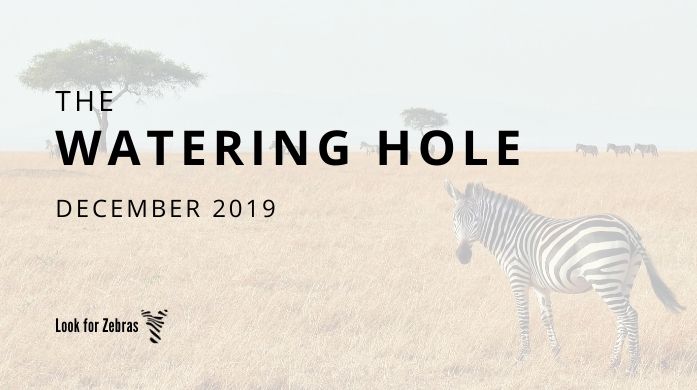Published by Lookforzebras
This month’s issue of The Watering Hole is inspired by this quote from Dead Poets Society:
- Practicing what you’re passionate about
- Be deliberate in your career decisions
- Nobody teaches us how to run a business.. but that doesn’t mean we can’t learn
- Since we’re running businesses, let’s do it productively
- And let’s invest productively
Practicing what you’re passionate about
Dr. Cory Fawcett of Prescription for Financial Success asks Should We Follow Our Passions or Do Something Practical? The word “practical” in this context essentially equates to income-generating. The heart of his answer to this question is that each of us should follow a practical passion.
We don’t need to settle for one or the other, though. In my own career, I chose preventive medicine – which is a lower-paying specialty – due to my passion for it. But I supplement my main source of income with side gigs.
Here’s a neat story of a doctor who is following a practical passion. Local news outlets have been abuzz about physician Timothy Wong, who recently opened the iHealth Clinic in Pittsburgh that charges a flat fee of $35 per patient. There is no insurance, co-pay, or even staff to handle billing and payments. A patient can expect to interact with just an iPad and the doctor himself. I’m excited to see what happens and hope that he’s successful!
For young doctors and students in search of their passions, check out the recommendations of fourth-year medical student Margaret Miller in Five Books, Five Podcasts for Every Medical Student.
Be deliberate in your career decisions
In his KevinMD article Debunking the myth that life gets easier once you finish medical training, Brent Lacey, MD, owner of The Scope of Practice, reminds us that a career in medicine – not just medical training – is hard. We have a tendency to think that things will get easier as we progress through our careers. But the truth is that the challenges merely evolve.
One of the best ways to remain satisfied in an ever-challenging profession is to be deliberate in all decisions we make that affect our careers. But sometimes, even with careful deliberation, it’s tough to know if a decision is going to turn out to be a good one. Smart Money MD’s article The one thing I wish I knew when I took my first job is worth a read. He actually writes about four things he wishes he knew when he took his first job, in hopes that they’ll help new grads ask the right questions as they’re making a big career decision.
One of the four, which he states is his “biggest regret” is not negotiating enough. Here are some considerations when negotiating a physician contract.
Nobody teaches us how to run a business.. but that doesn’t mean we can’t learn
It’s not just negotiation skills that many of us could use some extra insight on. Doctors, unless they’ve studied business as an undergrad or while getting an MBA, tend to not be business-savvy. This, as it turns out, may be a factor that leads to burnout.
In The Paradox for Docs on Doximity’s Op-Med, Debra E. Blaine, MD discusses that we (or the organizations we work for) have invited our patients to start acting like customers.
A San Francisco Business Times article Why your doctor is stressed and burned out suggests that among the reasons is that we’re managing employees.
On a side note, amidst all the rumble of burnout, it seems to not have a clear relationship with decreased quality of care. So we have this going for us. Check out the systematic review and meta-analysis of evidence relating health care provider burnout and quality of care by Tawfik, et al published in Annals of Internal Medicine.
Since we’re running businesses, let’s do it productively
Scrum: The Art of Doing Twice the Work in Half the Time isn’t a new book but is one I recently came across. Written by physician and Vietnam fighter pilot Jeff Sutherland, it covers team performance, fixing problems on a system-wide level, a process incorporating feedback to get things done, and fostering growth and happiness. It is perhaps a method by which some physicians could help prevent professional burnout.
And let’s invest productively
Financial Residency’s podcast and article How to Narrow Down Your Investment Choices goes over some basics of adding investment classes to your portfolio, including considering your portfolio allocation, your risk tolerance, and developing your own investment policy.
One of the least productive things you can do when it comes to finances and investing is worry. As a worrier, I know this from personal experience. Women Who Money helps out with this in How to Overcome 17 Money Worries. It goes over how to avoid worrying that you will never get out of debt, that you will lose your job, or you’ll never fully understand money and investing. And, also, being afraid of a financial disaster or afraid to ask for a raise.
For those who’ve mastered the basics and have additional money to invest, it may be time to learn about alternative investments. The Darwinian Doctor goes over the basics of hedge funds in What’s a hedge fund? I interview a hedge fund manager to find out.
Gather around the watering hole with me next month for some new material!

